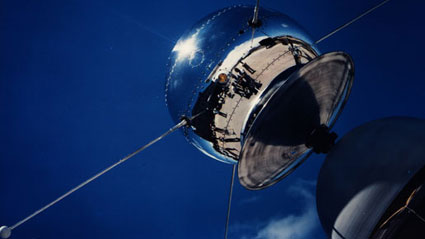Do you remember the likeable robot Wall-E who had the mission of cleaning up the Earth turned into a garbage dump by us, humans? Now it seems we are facing the risk of another apocalyptic scenario, though this time it is no cartoon or Hollywood blockbuster but something that is very real. Within a few years the space around our planet may well become cluttered with space junk. “Current data show there are around 650,000 objects orbiting the Earth, many of them from debris from derelict rockets and satellites,” said for Radio Bulgaria Associate Professor Alexey Stoev, Director of the Stara Zasgora branch of the Space Research and Technology Institute. If any of this space debris was to cross the orbit of a functioning satellite or space station it could cause serious damage. “Even a piece around 1 cm. in size moves at incredible speed and has such kinetic energy that a collision with a ship could be fatal. God forbid if it is an orbital station with humans on board. The collision would depressurize it and anyone on board would die,” this is how Ass. Prof. Stoev describes one of the most sinister possible scenarios. Disruptions in navigation, in radio communications and television, in the function of devices monitoring the Earth’s surface and the oceans are some of the possible problems.
To avoid all this, the world space powers have set themselves the task of monitoring and controlling technological debris in the lower and the medium Earth orbit. Bulgarian scientists, headed by Associate Prof. Stoev are part of a major international consortium together with colleagues from Russia, France, Germany and USA. A small monitoring station with a telescope and state-of-the-art computers for processing the images will be stationed in Bulgaria and will provide the specific coordinates of the objects under surveillance.
“We will also take part in modeling this technogenic junk so as to find out what the chances are of its crossing the orbit of any of the major functioning satellite systems or of any satellites yet to be launched,” Alexey Stoev explains. “This is a very serious and highly-responsible task I hope we shall tackle it successfully, as we have plenty of experience in this sphere. Back in 1959 three artificial satellite monitoring stations were put up in Bulgaria and this surveillance continued right up to 1987. Now we are resuming our work, though this time we are using most modern surveillance technology and high-performance parallel processing computers capable of monitoring massive databases, some of them containing the coordinates of 300,000 – 400,000 objects. They must all be subjected to evolutionary development to see what will happen to them in the coming years owing to changes in the Earth’s atmosphere and to changes in solar activity. These will be our tasks.”
 Part of the software will be developed by Bulgarian experts. The surveillance is expected to be launched at the end of summer and to add to the database. The project will cover ten years, but Ass. Prof Stoev says the Bulgarian team will continue their work afterwards because Bulgaria was among the first six countries in the world to have begun the monitoring of the first artificial satellites way back in 1959. But will taking part in such a project revive the country’s glory as a space power?
Part of the software will be developed by Bulgarian experts. The surveillance is expected to be launched at the end of summer and to add to the database. The project will cover ten years, but Ass. Prof Stoev says the Bulgarian team will continue their work afterwards because Bulgaria was among the first six countries in the world to have begun the monitoring of the first artificial satellites way back in 1959. But will taking part in such a project revive the country’s glory as a space power?
“Part of Bulgaria’s glory in space research lay precisely in these specialized devices,” Ass. Prof. Stoev says. “Years ago a special space telescope for monitoring functioning space satellites and gauging the distance to them, using a laser telemeter, was constructed at the Space Research and Technology Institute. And this, right here in Bulgaria. The telescope was fitted with a mirror 60 cms. in diameter, very serious work. The technology was developed entirely by Bulgarian engineers and was built by technologists from the Cosmos research and production plant in Stara Zagora, which is part of our institute. So, this is nothing new to us. Why is it that nowadays we are not motivating the children, who have been winning gold Olympic medals in physics, astronomy, computer sciences, these young people who graduate leading universities abroad, to come back to Bulgaria and develop ideas that are the cutting edge of technology? I think this is absolutely feasible and we, at our institute, fully intend to make it work.”
English version: Milena Daynova
The usurpation of cultural heritage is one of the many inevitable consequences of any military conflict, both historically and today. Until the end of the war in Ukraine, it is impossible to adequately analyse the extent of the damage caused to the..
Athens plans to modernise the Greek army by 2030 Greece's Defence Minister Nikos Dendias presented the plan for changes in the army to the parties in parliament. The reforms will cover all three branches of the military. By 2030, 33 units..
A short video kaleidoscope of the "untold stories" of worthy Bulgarians - scientists, entrepreneurs, engineers, artists - who have contributed to our country's good image in the eyes of the world opened an unconventional public forum that showcased the..
Nuredin Nuredinaj comes from the historical-geographical region of Gòra in Northeastern Albania, where 90% of the inhabitants identify themselves as..

+359 2 9336 661
